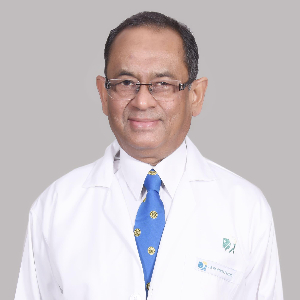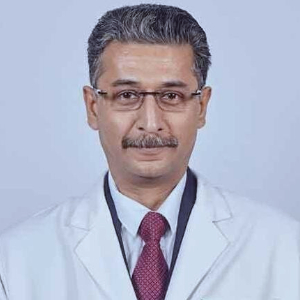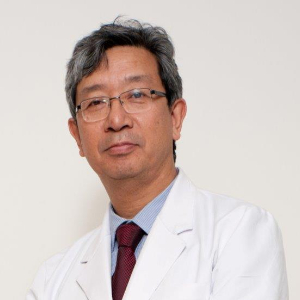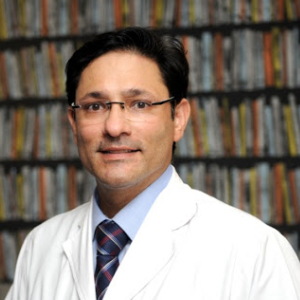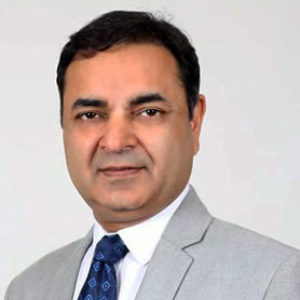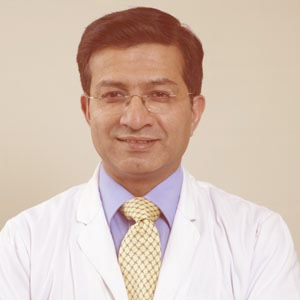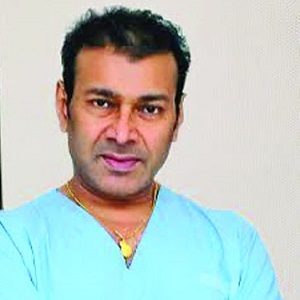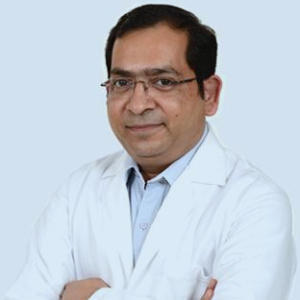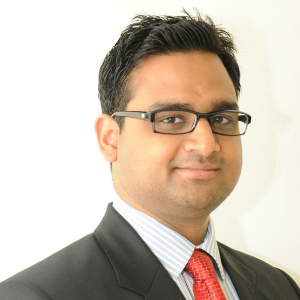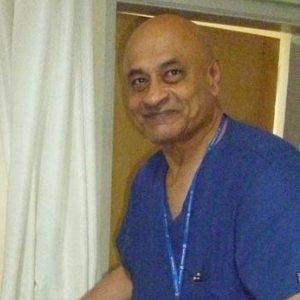Best Doctors in India for Myelopathy Treatment
- Neurosurgeon & Spine Surgeon, New Delhi, India
- Over 30 years’ experience
Profile Highlights:
- Dr. Rajendra Prasad is one of the most experienced Neurosurgeons and Spine surgeons in India.
- Dr. Rajendra Prasad is an expert in all neuro and spine surgeries that including micro neurosurgery, minimally invasive spine surgery, surgery for degenerative spine diseases, surgery for brain and spine trauma, and neuro tumor surgeries.
- Neurosurgeon, Gurugram, India
- Over 22 years’ experience
Profile Highlights:
- Dr. Sandeep Vaishya is a renowned Neurosurgeon in India, with over 22 years of proficient experience in the field of advanced neurosurgery.
- He has closely worked with some of the top-notch institutes and hospitals in India.
- Dr. Vaishya is regarded as one of the top surgeons of Gamma Knife Surgery in South Africa and is also considered a renowned surgeon for brachial plexus injuries.
- Neurosurgeon, Gurugram, India
- Over 32 years’ experience
Profile Highlights:
- Dr. Rana Patir is one of the most experienced and highly qualified Neurosurgeons in India.
- He holds an extensive experience of 32+ years as a neurosurgeon and has performed more than 10,000 neurosurgical procedures till date.
- Dr. Patir is an expert in all kinds of neuro and spine surgeries with a specialization in minimally invasive brain and spine surgery, Epilepsy surgery, pediatric neurosurgery, and neurovascular surgery.
- Neurosurgeon and Spine Surgeon, Gurugram, India
- Over 15 years’ experience
Profile Highlights:
- Dr. S K Rajan is a renowned Neurosurgeon in Gurugram who specializes in open as well as minimally invasive spinal surgeries and has performed over 3000 complex spinal surgeries for diseases and disorders.
- Dr. S K Rajan’s expertise lies in Craniovertebral Junction and Lumbosacral Junction surgeries and is also an expert in spinal fracture surgeries, slipped discs, canal stenosis, and surgery for spinal tumors and spinal tuberculosis.
- Neurosurgeon and Spine Surgeon, New Delhi, India
- Over 25 years’ experience
Profile Highlights:
- Completing over 9000 successful neurological procedures, and still counting, Dr. Sudhir Tyagi is one of the top-notch names in India, diligently catering to neurological assistance with his vast knowledge and adept expertise.
- In fact, Dr. Sudhir Tyagi is the first neurosurgeon to use the Image Fusion Technique to localize targets in the deep part of the brain to perform functional stereotactic surgeries. He has great experience in all types of brain and spine surgeries.
- Neurosurgeon, New Delhi, India
- Over 20 years’ experience
Profile Highlights:
- Dr. Bipin Walia is one of the most famous neurosurgeons who has performed over 7000 successful neurosurgeries so far.
- He earned his MBBS and MS (General Surgery) degree from Armed Forces Medical College, Pune, followed by which his, M.Ch(Neurosurgery) from All India Institute of Medical Sciences, New Delhi.
- Dr. Bipin Walia has over 20 years of experience with his outstanding performance earning him quite some rewards and recognition.
- Orthopedic & Spine Surgeon, Chennai, India
- Over 33 years’ experience
Profile Highlights:
- Dr. Sajan K Hegde is an Orthopedic & Spine Surgeon with 33+ years of experience and is known for performing spine and joint surgeries using the latest technological advancements like minimally invasive sacroiliac joint fusion and cervical artificial disc.
- He has initiated many modern instrumentation systems in India including Cotrel, BAK cages, Harms Mesh Systems, and more.
- Dr. Hedge holds expertise in surgical and non-surgical spine treatments, tackling trauma, et al.
- Neurosurgeon & Spine Surgeon, New Delhi, India
- Over 20 years’ experience
Profile Highlights:
- Dr. Anil Kumar Kansal is a well-known neuro and spine surgeon in Delhi with over 2 decades of experience.
- He has performed over 10,000 neurosurgical procedures including 4500 brain surgeries, 500 endoscopic brain surgeries, 2000 spine surgeries, 400 aneurysms, and 500 anterior cervical microdiscectomies with 60 disc replacement procedures.
- Dr. Kansal holds great skills in aneurysm clippings, neuro-modulation, epilepsy, and neurovascular surgery and has handled several such types of cases in his career.
- Orthopedic Surgeon & Spine Surgeon, Gurugram, India
- Over 10 years’ experience
Profile Highlights:
- Dr. Himanshu Tyagi is a well-known Spine surgeon specializing in Minimally Invasive Spine Surgeries (MISS).
- He has over a decade of experience in the field and is trained to perform all kinds of reconstructive and corrective spinal surgeries.
- He is trained to perform intradural as well as extradural spinal procedures and does surgeries by both anterior and posterior approaches.
- Orthopedic Surgeon & Spine Surgeon, New Delhi, India
- Over 30 years’ experience
Profile Highlights:
- Dr. Rajagopalan Krishnan is a well-known orthopedic and spine surgeon in India.
- He is one of the most highly accomplished and successful spine surgeons in Delhi performing more than 350 spine surgeries every year.
- He provides management and treatment of spinal disorders that includes disc and degenerative disorder, spinal tumor, spinal fractures, spinal trauma, and spinal infections.
Best Hospitals in India for Myelopathy Treatment
Indraprastha Apollo Hospital, New Delhi
- City: New Delhi, India
Hospital Highlights:
- Indraprastha Apollo Hospital is a 700-bedded multispecialty hospital in the heart of the capital of India. It is a part of Apollo Hospital group, one of India’s most reputed healthcare chains. Indraprastha Apollo Hospital has been accredited by Joint Commission International, making it the first internationally accredited hospital in the country in 2005.
- There are 52 specialties in the hospital with one of the best cardiology centers in the country. The hospital is also equipped with State of the art infrastructure facilities with the largest Sleep Lab in Asia and the largest number of ICU bed facilities in India.
- The hospital also has one of the largest dialysis units in India along with a dedicated Bone Marrow Transplant unit.
- The latest and highly advanced technologies that are installed in the hospital include Da Vinci Robotic Surgery System, PET-MR, PET-CT, Cobalt-based HDR Brachytherapy, Brain Lab Navigation System, Tilting MRI, Portable CT scanner, 3 Tesla MRI, 128 Slice CT scanner, DSA Lab, Endosonography, Hyperbaric Chamber and Fibro scan.
Fortis Memorial Research Institute, Gurugram
- City: Gurugram, India
Hospital Highlights:
- Fortis Memorial Research Institute is a multi-super-specialty, quaternary care hospital with 1000 beds. The hospital comprises reputed clinicians, and international faculty and is also equipped with cutting-edge technology. The hospital is a part of Fortis Healthcare Limited, a reputed chain of private hospitals in India.
- It is a NABH-accredited hospital that is spread across 11 acres of land and has a capacity of 1000 beds. The hospital has 55 specialties and is one of the premier health care centers in the Asia Pacific region popularly known as “the Mecca of Healthcare”.
- The hospital has 260 diagnostic centers and is also equipped with the latest and advanced techniques that include 3 Telsa which is the world’s first Digital MRI technology. The hospital also has world-class Radiation Therapy techniques which have been developed by leading technology experts from Elekta and Brain Lab.
Apollo Hospital, Chennai
- City: Chennai, India
Hospital Highlights:
- Apollo Hospitals, Chennai, is one of the best hospitals for heart care in India. Over the years, Apollo has expanded all over India, as a healthcare chain.
- India’s first ‘Only Pancreas’ transplant was performed in Apollo Hospital. The hospital is known for successfully performing Asia’s first en-bloc combined heart and liver transplant, and over the years, it has attained a remarkable achievement in the global healthcare space. Around 3-4 organ transplants are performed in the hospital per day.
- Equipped with over 500 beds, this hospital in Chennai was established in 1983 and since then has been among the most preferred hospital for patients from all over the world.
- The hospital holds accreditation of the NABH and JCI and is the first hospital in India to be ISO 9001 and ISO 14001 certified. It is also the first South Indian Hospital to receive subsequent reaccreditation from the JCI USA 4 times.
Medanta-The Medicity, Gurgaon
- City: Gurugram, India
Hospital Highlights:
- One of India’s best and largest multi-specialty hospitals, Medanta was built with the aim to bring India to the highest standards of medical care. The hospital has been providing the best medical services to its patients, since its inception, with care, commitment, and compassion.
- Equipped with 1250 beds, the hospital was founded by Dr. Naresh Trehan in the year 2009 with an aim to provide the best medical care at affordable costs. The hospital is spread across 43 acres and includes 45 operation theatres and 350 beds dedicated solely to ICU. The hospital includes over 800 doctors, and more than 22 specialty departments and has a dedicated floor for individual specialty in order to offer the best services under one roof.
- The hospital is considered one of the premier institutes in India for Cardiac Care and includes staffs and members of high caliber. The hospital has 6 distinct centers of excellence.
Max Super Specialty Hospital, New Delhi
- City: New Delhi, India
Hospital Highlights:
- One of the well-regarded providers in India committed to the highest standards of clinical excellence and patient care, Max Super Specialty Hospital is a part of Max Healthcare, which is the second-largest healthcare chain in India. Regarded as one of the most well-regarded healthcare providers in the country, Max Super Specialty Hospital is committed to the highest standards of clinical excellence as well as patient care. The hospital is also equipped with the latest technology as well as cutting-edge research. The hospital is known to deliver and ensure the highest level of patient care.
- The hospital has more than 500 beds and offers treatment for over 35 specialties. The hospital also holds the credit of having installed the first Brain Suite in Asia. This is a highly advanced Neurosurgical machine that allows MRI to be taken while surgery is ongoing.
- Other advanced and latest technologies are also installed in the hospital such as the 1.5 Tesla MRI machine, 64 Slice CT Angiography, 4D ECHO, LINAC, and 3.5T MRI machine.
Artemis Hospital, Gurugram
- City: Gurugram, India
Hospital Highlights:
- One of the most well-known hospitals in the Delhi NCR, Artemis Hospital is the first hospital in Gurugram to get accredited by the Joint Commission International.
- With more than 40 specialties, the hospital has been designed to be one of the most technically advanced hospitals in the country, with the best medical and surgical health care. The hospital has eleven special and dedicated centers, for Heart, Cancer, Neurosciences, etc.
- The latest technologies in the hospital include Endovascular Hybrid Operating Suite and Flat panel Cath Labs for the cardiovascular department, 3 Tesla MRI, 16 slice PET CT, 64 Slice Cardiac CT Scan, HDR Brachytherapy, and highly advanced Image Guided Radiation Therapy techniques (LINAC) are installed in the hospital.
- The hospital has won several awards as well, since its inception.
BLK Max Super Specialty Hospital, New Delhi
- City: New Delhi, India
Hospital Highlights:
- Equipped with 650 beds, BLK Superspecialty Hospital is the largest stand-alone private sector hospital in Delhi.
- With over 1500 healthcare providers and 150 globally renowned super specialists, the hospital is one of Asia’s largest Bone Marrow Transplant Centres. The hospital is known for having some of the best cancer doctors in the country.
- The hospital is NABH and NABL accredited and was inaugurated by the first Prime Minister of India. Pt. Jawahar Lal Nehru.
Gleneagles Global Hospitals, Chennai
- City: Chennai, India
Hospital Highlights:
- Established in 1999, Gleneagles Global Hospital, Chennai, is one of the top healthcare facilities in Southern India. It is part of the Gleneagles Hospital Chain, which is the fourth largest healthcare chain in the country. The hospital specializes in multi-organ transplants of kidneys, liver, lungs, heart, etc.
- The hospital has an excellent infrastructure and state-of-the-art lab and equipment set-up. The hospital boasts cutting-edge technologies, a highly skilled team of doctors and surgeons, and trained support staff. Located in Perumbakam, Chennai, it is one of India’s premier health care destinations. The hospital has performed some of the most complex surgical and clinical procedures in India including multi-organ transplantations.
- The hospital’s lung transplantation program is one of the best in the country. The hospital is known for having performed India’s first single lung transplant and first minimal invasive lung transplant. It is also the only Indian hospital to be associated with King’s College Hospital, London, United Kingdom for liver transplantations.
Fortis Hospital, Mulund, Mumbai
- City: Mumbai, India
Hospital Highlights:
- Fortis Hospital in Mulund is a 315-bed multi-speciality tertiary care hospital with five JCI accreditations that offers a wide variety of diagnostic and therapeutic services. The Fortis Hospital in Mulund delivers patient-centred treatment with cutting-edge technology, highly skilled and experienced surgeons, and paramedical staff.
- This institution houses Maharashtra’s largest multi-organ transplant centre. It is also the first heart transplant centre in western India to conduct 100 or more consecutive heart transplants in under four years. It is the only hospital in the city to have multi-organ transplants and has handled the youngest patient for angioplasty. Fortis Hospital Mulund now boasts the first advanced surgical robot in central Mumbai.
- Cardiology and heart surgery, urology, nephrology, neurosciences, orthopaedics, digestive care, emergency and critical care, and maternity care are among the services provided by the hospital.
Kokilaben Dhirubhai Ambani Hospital, Mumbai
- City: Mumbai, India
Hospital Highlights:
- Kokilaben Dhirubhai Ambani Hospital, Named after the wife of Indian industrialist Dhirubhai Ambani, the founder of Reliance Industries, this is one of the top hospitals in Mumbai. This 750-bed multi-specialty hospital became operational in 2009. Known as one of India’s most advanced tertiary care facilities, the hospital is designed to raise India’s global standing as a healthcare hub, with an emphasis on excellence in clinical services.
- Kokilaben Dhirubhai Ambani Hospital uses Protocol and Care Pathway based treatment models to ensure the best outcomes for patients.
- The hospital represents a confluence of top-notch talent, cutting-edge technology, state-of-the-art infrastructure, and, most importantly commitment.
- The hospital also holds the accreditation of the NABH, NABL, CAP, and JCI.
- The hospital has been recognized as the No. 1 Multispecialty Hospital in Mumbai and the West Zone for the fifth year in a row in 2020 by The Week.
Myelopathy
Myelopathy is an injury to the spinal cord caused by severe compression. This compression may result from trauma, congenital stenosis, disc herniation, or degenerative disease. Your spinal cord is a group of nerves housed inside your spine running almost its entire length. If any portion of the spinal cord gets compressed or constricted, the resulting symptoms are termed myelopathy.
Types
Depending on where the condition is on the spine, there are various types of this condition:
Cervical myelopathy- This type of myelopathy affects the neck and is also the most common form of this condition. It’s generally caused by degeneration in the cervical spine, and it might lead to weakness, numbness, and tingling in your hands, arms, and legs.
Thoracic myelopathy- This type of myelopathy affects your mid-spine. It’s generally caused by bulging or herniated discs, bone spurs, or in some cases, spinal trauma. The signs and symptoms generally come on slowly, unless the cause of the compression is trauma. Some of these symptoms include numbness and weakness in the legs, loss of coordination, as well as difficulty in walking.
Lumbar myelopathy- This is the least common type of myelopathy, which affects the lower part of the spine, also known as the lumbar region.
Symptoms
When your spinal cord is compressed or injured, it might lead to loss of sensation, loss of function, as well as pain or discomfort in the area at or below your compression point. Some other symptoms of myelopathy include:
- Neck, arm, leg, or lower back pain
- A sensation of tingling, numbness, or weakness
- Increased reflexes in extremities or the development of abnormal reflexes
- Difficulty with fine motor skills, such as buttoning a shirt or writing
- Difficulty while walking
- Issues with balance and coordination
- Loss of urinary or bowel control
Generally, the exact symptoms depend on where in the spine the condition is present.
Causes
Myelopathy generally develops slowly due to the gradual degeneration of the spine, but it might also take an acute form or stem from a spine deformity that was already present at birth. The most common causes are generally degenerative spinal conditions, such as spinal stenosis, which is a narrowing of the bony passageways of the spine, through which the spinal cord, as well as the nerve roots, travel.
Central disc herniations may also result in compression on the spinal cord, which can lead to the development of myelopathy. Autoimmune disorders, like rheumatoid arthritis in the spine, may lead to degenerative changes as well, in the vertebrae which result in spinal cord compression and myelopathy.
Hernias, cysts, hematomas, as well as spinal tumors, including bone cancer, might also press on the spinal cord and lead to myelopathy.
Sometimes, acute myelopathy might also develop quickly due to spinal injury, spinal infection, inflammatory disease, neurological disorders, or even radiation therapy.
Diagnosis
Since the symptoms of myelopathy are not unique to the condition, your doctor is likely going to recommend the following tests for the diagnosis of the condition:
X-ray
An X-ray in order to rule out any other problems.
MRI
An MRI scan for a detailed look of the spine and spinal canal, which is able to show areas of stenosis.
Fluoroscopy
Fluoroscopy is used to reveal any abnormalities of the spinal cord. It is sometimes used instead of MRI for patients who are unable to sit inside the MRI machine.
Electromyogram
Electrical tests, such as an electromyogram might also be recommended. These tests measures how nerve stimulation in an arm, hand, leg or foot is connecting through the spinal cord to the brain.
In some cases, myelopathy is also added at the end of another underlying condition to indicate the involvement of your spinal cord. For example, your doctor might let you know that you are having cervical stenosis with myelopathy or thoracic disc disorder with myelopathy. Similarly, if your spinal cord is not involved, your diagnosis is going to say- ‘without myelopathy’.
If your myelopathy is caused as a complication of another disease, your doctor might refer to it in the terms of this disease. For example, diabetic myelopathy means that your spinal cord has been damaged due to your diabetes.
Treatment
Treatment is going to vary, depending on the type of myelopathy, how far the condition has progressed as well as the cause. For example, if a bacterial infection is the cause of your myelopathy, then treating the infection with antibiotics might treat the compression on the nerves. Some of the other possible treatments include:

